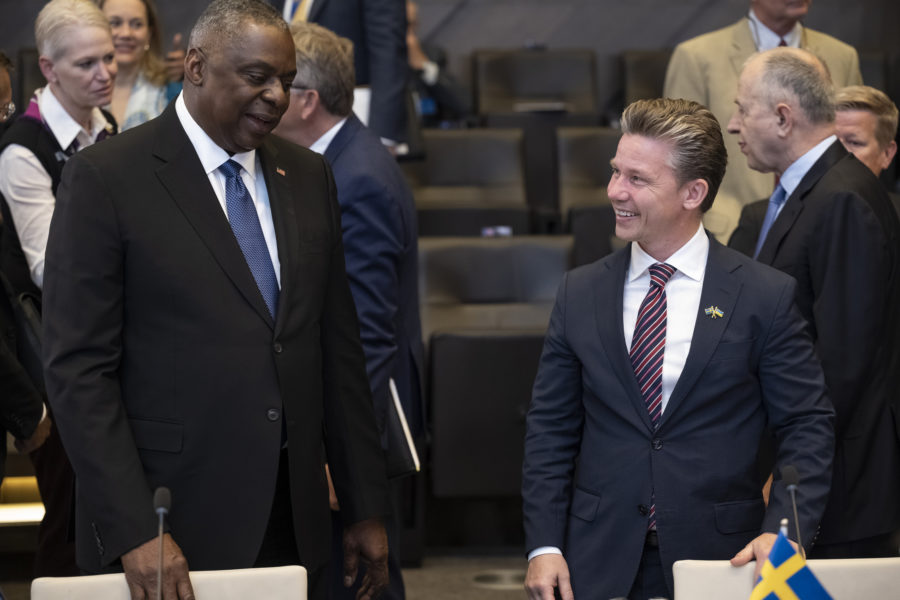BRUSSELS—With Sweden’s bid for NATO entry hanging in the balance, the U.S. and key allies are doing their best to push Stockholm over the finish line.
“My message has been now for many, many months that actually Sweden has delivered and that’s the message from allies,” NATO Secretary General Jens Stoltenberg said June 16.
After Russia launched its invasion of Ukraine in February 2022, Finland and Sweden applied to join NATO. Finland was swiftly approved and joined the alliance in April.
Decisions on membership, however, need to be made unanimously by all member nations, and Turkey has raised a variety of objections, ranging from allegations that Kurdish extremists are living in Sweden to more recent complaints over anti-Turkey protests in Sweden. So the Swedes have had to wait.
U.S. officials’ hope is that the alliance’s decision to admit Sweden as its 32nd member will come when NATO holds a critical summit meeting in Vilnius, Lithuania in July. By then, officials say, Turkey’s resistance may fade since President Recep Tayyip Erdogan has been reelected to another term and his election year politics are behind him.
To press Sweden’s case, NATO sent a delegation to Turkey just before the defense ministers meeting got underway.
U.S. Secretary of Defense Lloyd J. Austin III also raised the issue when he met briefly on June 16 with Turkey’s new defense minister, Yasar Guler, who assumed the position in early June.
“Of course, (I) seize every opportunity to encourage him to move forward and approve the accession of Sweden,” Austin said in response to a question from Air & Space Forces Magazine during a June 16 press conference.
Sweden has long worked closely with the U.S. and other Western militaries. Current and former NATO officials say Sweden would bring a lot to the table for NATO.
“We have trained with them in a number of cases, and so being interoperable in a very short period of time, it would be no challenge with Sweden,” Austin said. “It will enhance our ability to be aware of what’s going on in the maritime and the aerial domains.”
Underscoring the two countries’ close ties, two B-1s from a U.S. Bomber Task Force landed in Sweden on June 19, according to the Swedish military. And Sweden recently joined NATO nations in a two-week air exercise, Arctic Challenge Exercise. As part of its assistance to Ukraine, Sweden has even offered to train Ukrainian pilots to fly Gripen multirole fighters.
“Sweden is a strong democracy and it’s a country with substantial military capability,” Austin said. “They’ve invested a lot in their force.”
Retired Air Force Gen. Philip M. Breedlove, the former NATO Supreme Allied Commander, agreed.
“They have exercised with us at the highest levels of sophistication, technology, tactics, techniques, and procedures,” Breedlove told Air & Space Forces Magazine. “They have been doing that for some time. They bring the capability to this alliance the moment they hang their flag on the pole, and that’s to be celebrated.”
Some analysts say Sweden works so closely with NATO that it will remain a close partner even if it doesn’t formally get into the alliance.
“I am pretty chill about this whole thing,” Michael O’Hanlon of the Brookings Institution told Air & Space Forces Magazine. “Sweden is already a partner that is so close to NATO that most military collaboration and planning is already rock solid. It does not border Russia so its vulnerability is limited.”
But Sweden left no doubt that it feels that it belongs in NATO and is trying to hasten the process.
Pal Jonson, Sweden’s defense minister, was a prominent presence at NATO and was pictured walking the hallways with Stoltenberg and in friendly discussions with Austin.
Jonson also wrote a joint article with Sweden’s prime minister Ulf Kristersson, noting that their country would allow NATO to base forces and equipment on its territory even if it is not a member of the alliance yet.
“The government has decided that the Swedish Armed Forces may undertake preparations with NATO and NATO countries to enable future joint operations,” they wrote.
“The preparations may consist of temporary basing of foreign equipment and personnel on Swedish territory. The decision sends a clear signal to Russia and strengthens Sweden’s defense.”

